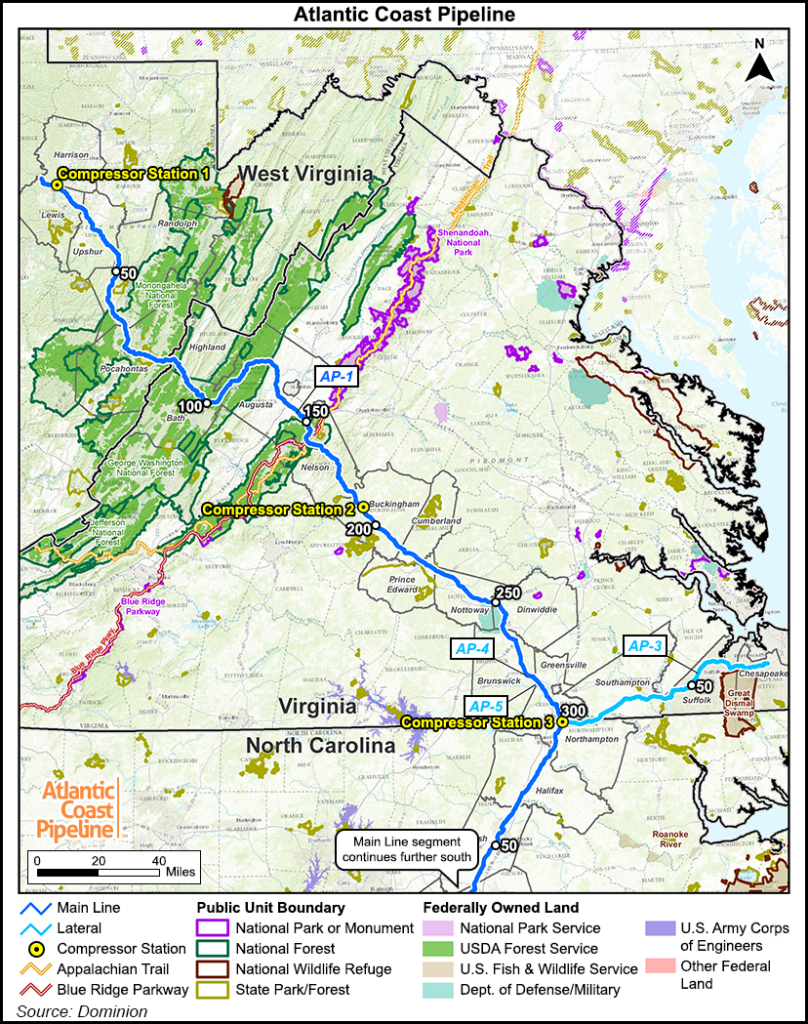Regulatory | Infrastructure | NGI All News Access | NGI The Weekly Gas Market Report
Big Win for ACP as U.S. Supreme Court Reverses Decision in Appalachian Trail Crossing Case
In a major victory for the embattled Atlantic Coast Pipeline (ACP), the U.S. Supreme Court on Monday reversed a lower court ruling that had jeopardized the 604-mile, 1.5 Bcf/d project’s proposed crossing beneath the Appalachian National Scenic Trail.

The justices ruled 7-2 in favor of the pipeline, a decision that could prove pivotal in helping ACP avoid re-routing its $8 billion project as it seeks to build a conduit for Appalachian Basin natural gas to reach markets in the Southeast. The ruling also has implications for the similarly routed Mountain Valley Pipeline (MVP).
The case, United States Forest Service et al v. Cowpasture River Preservation Association et al, hinged on whether the Forest Service had the authority to issue a right-of-way for ACP to construct a 0.1-mile underground crossing of a portion of the Trail in the George Washington National Forest.
Pipeline opponents, seeking to uphold a late 2018 ruling from the U.S. Court of Appeals for the Fourth Circuit, argued that since the Appalachian Trail is administered by the National Park Service it is exempted from USFS authority to permit the proposed crossing.
To the contrary, the majority opinion, penned by Justice Clarence Thomas, found that “the Park Service has a limited role over only the Trail, not the lands that the Trail crosses…responsibility for the Trail and jurisdiction over the lands that the Trail crosses can and must be separated for purposes of determining whether the Forest Service can grant a right-of-way.”
ACP spokesperson Ann Nallo cheered the Supreme Court’s ruling.
“Today’s decision is an affirmation for the Atlantic Coast Pipeline and communities across our region that are depending on it for jobs, economic growth and clean energy,” Nallo said. “We look forward to resolving the remaining project permits.”
Analysts at ClearView Energy Partners LLC said the decision “settles the question of whether ACP’s route would need to be modified to cross the Appalachian Trail — and the answer is ”no.’” The ruling is “constructive” for both ACP and MVP, analysts said.
Still, more work remains for the two transmission pipelines, which have followed parallel tracks of intense scrutiny in the courts since receiving FERC certificates in late 2017.
In the case of ACP, “the Fourth Circuit vacated the Forest Service’s approvals for multiple failings related to the National Environmental Policy Act review and consistency with its own regulations,” the ClearView analysts noted. “The Forest Service and ACP only appealed the Fourth Circuit’s ruling that the Service lacked the authority to approve the horizontal directional drilling to build the project underneath the Appalachian Trail.
“With this issue resolved, we expect the Forest Service to issue the draft supplemental environmental impact statement that it announced on June 11 in July as planned. A comment period would follow,” and the agency could issue the final supplemental statement later this year.
ACP, designed to run from West Virginia into Virginia and North Carolina, is being developed by Dominion Energy as part of a joint venture with Duke Energy.
© 2024 Natural Gas Intelligence. All rights reserved.
ISSN © 1532-1231 | ISSN © 2577-9877 | ISSN © 1532-1266 |
